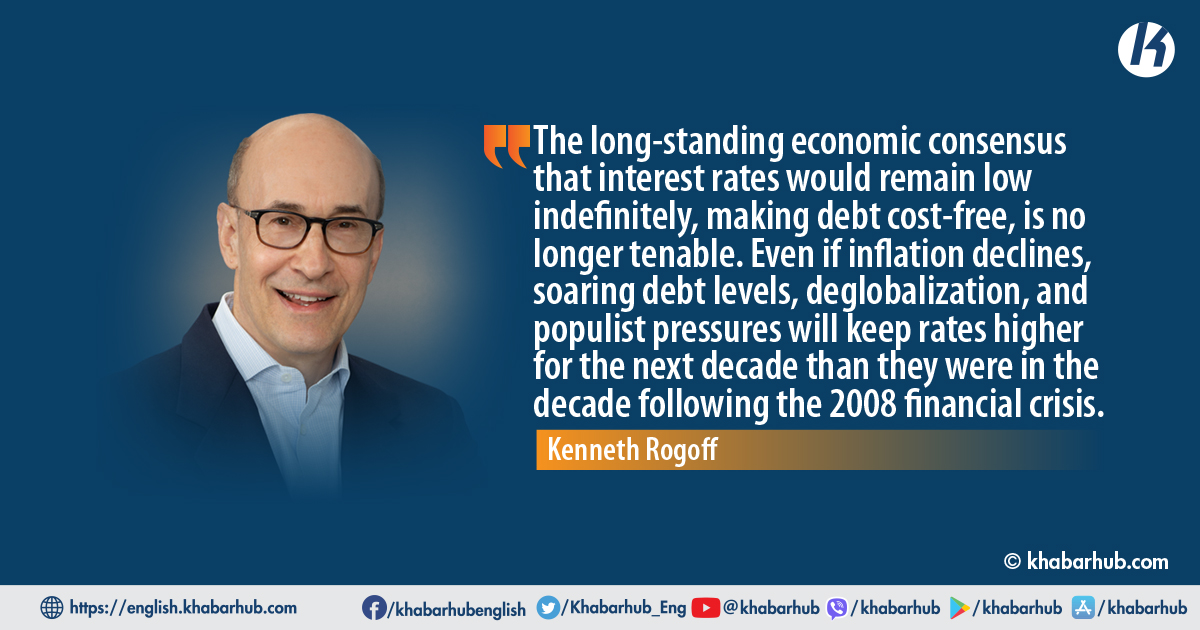Even with the recent partial retreat in long-term real and nominal interest rates, they remain well above the ultra-low levels to which policymakers had grown accustomed, and they are likely to stay at such levels even as inflation retreats.
It is now past time to revisit the widely prevailing “free lunch” view of government debt.
The idea that interest rates would be low forever seemed to support the view that any concern about debt was an endorsement of “austerity.”
Many came to believe that governments should run large deficits during recessions and only slightly smaller deficits in normal times.
No one seemed concerned with the possible risks, in particular to inflation and interest rates.
The left championed the notion that government debt could be used to expand social programs, going beyond what could be generated by reducing military spending, while those on the right seemed to believe that taxes exist only to be cut.
The most misguided approach involved using central banks to purchase government debt, which appeared costless when short-term interest rates were zero.
This idea is at the core of Modern Monetary Theory and “helicopter money.”
In recent years, even prominent macroeconomists have floated the idea of having the US Federal Reserve write off government debt after soaking it up through quantitative easing, a seemingly simple solution to any potential sovereign-debt problem.
But this approach assumed that even if global real interest rates rose, any increase would be gradual and temporary.
Even demographic shifts, often cited as a rationale for perpetually low interest rates, may affect developed countries differently as they increase spending to support rapidly aging populations.
The possibility that a sharp rise in interest rates would dramatically increase interest payments on existing debt, including debt held by central banks as bank reserves, was simply dismissed.
But here we are: the Fed, which previously paid zero interest on these reserves, is now paying more than 5%.
Aside from a few notable exceptions, those who championed the notion that debt is a free lunch have not acknowledged the likelihood of a new reality.
At a recent conference, I listened to a well-known financial commentator who had been a staunch advocate of the “lower forever” narrative and seemed unaware that it had been thoroughly debunked.
When pressed, they conceded that if interest rates do not quickly revert to the ultra-low levels of the 2010s, budget deficits might matter after all.
But they were reluctant to admit that the existing debt overhang could pose a problem, as this would impugn their previous endorsements of spendthrift fiscal policies.
Similarly, in a recent paper about the record levels of global debt, presented to the world’s leading central bankers at this year’s Jackson Hole conference, Serkan Arslanalp and Barry Eichengreen appeared reticent to discuss the implications of the current debt overhang or the connection between high government debt and sluggish growth in countries like Japan and Italy.
To be sure, the next recession, whenever it occurs, will likely lead to a significant decrease in interest rates, potentially offering a temporary respite to the wildly overleveraged US commercial real-estate market, where the mantra today is “stay alive until ’25.”
If property owners can endure another year of falling rents and surging financing costs, the thinking goes, a sharp drop in interest rates in 2025 could stem the tide of red ink threatening to drown their businesses.
But even if inflation declines, interest rates will likely remain higher for the next decade than they were in the decade following the 2008 financial crisis.
This reflects a variety of factors, including soaring debt levels, deglobalization, increased defense spending, the green transition, populist demands for income redistribution, and persistent inflation.
While it is feasible to expand social programs or boost military capabilities without running large deficits, doing so without raising taxes is not costless. We are likely to find out the hard way that it never was.
Even demographic shifts, often cited as a rationale for perpetually low interest rates, may affect developed countries differently as they increase spending to support rapidly aging populations.
While the world can certainly adapt to higher interest rates, the transition is still ongoing.
The shift could be particularly challenging for European economies, given that ultra-low interest rates have been the glue holding the eurozone together.
The European Central Bank’s “whatever it takes” bailout policies appeared costless when interest rates were near zero, but it is unclear whether the bloc can survive future crises if real interest rates remain high.
As I have previously argued, Japan will struggle to move from its “zero forever” interest-rate policies, as its government and financial system have grown accustomed to treating debt as cost-free.
In the United States, the commercial real-estate sector’s vulnerabilities, together with increased borrowing, could trigger another wave of inflation.
Moreover, while major emerging economies have managed to cope with high interest rates so far, they face enormous fiscal pressures.
In this new global environment, policymakers and economists, even those who previously belonged to the “lower forever” camp, may need to reassess their beliefs in light of current market realities.
While it is feasible to expand social programs or boost military capabilities without running large deficits, doing so without raising taxes is not costless. We are likely to find out the hard way that it never was.
(Kenneth Rogoff is Professor of Economics and Public Policy at Harvard University)
Copyright: Project Syndicate









Comment